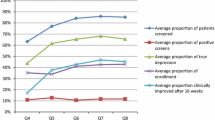Abstract
Behavioral health carve-out arrangements create financial disincentives for primary care providers (PCPs) to treat depression. A novel collaboration between a primary care practice, a health insurer, and a managed behavioral health organization (MBHO) allows PCPs to receive reimbursement and schedule longer appointments to care for depressed patients. This article describes the details of the arrangement, and early results of this collaboration. Early results find that financial incentives are critical for implementation, but that time incentives do not appear to motivate PCPs. Sustainability of this model will require participation of multiple primary care practices, health insurers, and MBHOs.
Similar content being viewed by others
References
D. S. Brody, S. R. Hahn, R. L. Spitzer, K. Kroenke, M. Linzer, F. V. Gruy de and J. B. Williams, Identifying patients with depression in the primary care setting: A more efficient method. Archives of Internal Medicine 158 (1998) 2469-2475
R. G. Frank, T. G. McGuire, S. L. Normand and H. H. Goldman, The value of mental health care at the system level: The case of treating depression. Health Affairs (Millwood) 18 (1999) 71-88
S. Gilbody, P. Whitty, J. Grimshaw and R. Thomas, Educational and organizational interventions to improve the management of depression in primary care: A systematic review. JAMA 289 (2003) 3145-3151
W. Katon and H. Schulberg, Epidemiology of depression in primary care. General Hospital Psychiatry 14 (1992) 237-247
D. J. Katzelnick, G. E. Simon, S. D. Pearson, W. G. Manning, C. P. Helstad, H. J. Henk, S. M. Cole, E. H. Lin, L. H. Taylor and K. A. Kobak, Randomized trial of a depression management program in high utilizers of medical care. Archives of Family Medicine 9 (2000) 345-351
R. C. Kessler, P. Berglund, O. Demler, R. Jin, D. Koretz, K. R. Merikangas, A. J. Rush, E. E. Walters and P. S. Wang, The epidemiology of major depressive disorder: Results from the National Comorbidity Survey Replication (NCS-R). JAMA 289 (2003) 3095-3105
G. E. Kikano, S. J. Zyzanski, R. S. Gotler and K. C. Stange, High-volume practice: Are there trade-offs?. Family Practice Manager 7 (2000) 63-64
E. A. McGlynn, S. M. Asch, J. Adams, J. Keesey, J. Hicks, A. DeCristofaro and E. A. Kerr, The quality of health care delivered to adults in the United States. The New England Journal of Medicine 348 (2003) 2635-2645
S. E. Moser, J. N. Dorsch and R. Kellerman, The RAFT approach to academic detailing with preceptors. Family Medicine 36 (2004) 316-318
G. E. Simon, E. J. Ludman, S. Tutty, B. Operskalski and M. Korff Von, Telephone psychotherapy and telephone care management for primary care patients starting antidepressant treatment: A randomized controlled trial. JAMA 292 (2004) 935-942
Author information
Authors and Affiliations
Rights and permissions
About this article
Cite this article
Feldman, M.D., Ong, M.K., Lee, D.L. et al. Realigning Economic Incentives for Depression Care at UCSF. Adm Policy Ment Health 33, 34–38 (2006). https://doi.org/10.1007/s10488-005-4233-3
Published:
Issue Date:
DOI: https://doi.org/10.1007/s10488-005-4233-3




